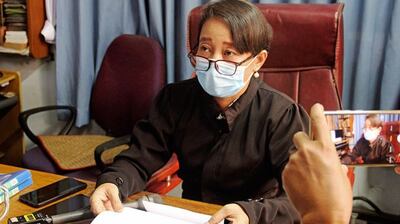Myanmar’s junta broke the law in arresting Aung San Suu Kyi on the day it orchestrated a coup d’état, and its leadership should face trial for this, according to one of the country’s most prominent lawyers, who urged authorities to drop charges against the former State Counselor and set her free.
Aung San Suu Kyi, ousted and arrested with other top political leaders during the coup by the Myanmar military on Feb. 1, faces seven charges, including sedition, which her lawyers say are trumped-up offenses to discredit her. Ex-president Win Myint also has been charged with sedition.
Military forces overthrew Aung San Suu Kyi’s elected government based on accusations that November 2020 landslide elections won by Aung San Suu Kyi’s National League for Democracy (NLD) were marred by voter fraud. The junta, which has not produced evidence of fraudulent elections, has led a violent crackdown on protesters opposed to its rule.
The junta has charged Aung San Suu Kyi with seven criminal offenses for allegedly violating the colonial-era Official Secrets Act and for corruption, sedition, violation of the Telecommunications Law, possession of unlicensed walkie-talkie radios, and two violations of protocols set up to contain the spread of coronavirus.
Four counts of alleged “corruption” were added to the list during a court hearing Monday, although prosecutors have yet to release details of the charges.
Speaking to RFA’s Myanmar Service, veteran High Court lawyer Kyee Myint said the coup leaders had acted in violation of the law and that Aung San Suu Kyi should lead their prosecution.
“If you look at the Code of Criminal Procedure and the Citizens' Freedom Law, you’ll find that Daw Suu cannot be prosecuted,” he said.
“Actually, you could prosecute [the junta]. They entered [her home] without [the requisite] two witnesses and made an unlawful arrest of citizens. The detainees were held for more than 24 hours in violation of the Citizens’ Rights Act. They didn’t have any search warrants or arrest warrants or even a search form.”
Kyee Myint noted that the Citizens’ Rights Act was still in effect when Aung San Suu Kyi and Win Myint were arrested.
“Under the existing laws at that time, [the junta troops] were the violators, while Daw Suu was unlawfully arrested and prosecuted,” he said, using an honorific reference to the 76-year-old leader. “[She and other detained NLD leaders] must be released according to the law.”
During Aung San Suu Kyi’s trial proceedings on Monday, a court in the capitol Naypyidaw heard testimonies from the prosecution’s witnesses related to three of the charges against her. Her lawyer, Min Min Soe, said the three witnesses from the Naypyidaw Military Command Division testified that the search they conducted on the Nobel Peace Laureate’s home on Feb. 1 related to the Telecommunication Law violation took place without warrants.

‘A judiciary that oppresses its citizens’
Nang Lin, a leader of the Old Takatha Students’ Association, noted that the military has tried to control the country’s judiciary under previous governments by arresting people and convicting them “without bothering to find out whether they were really guilty or not,” but said the legal system is now “crumbling” under junta leadership.
“There have been so many cases filed by the military like this since the Feb. 1 coup,” he said.
“The judiciary in Myanmar is not acting in accordance with the law or the proper reasoning of judges, but instead is under total command of the military and is falling apart. It is a judiciary that oppresses its citizens.”
Khin Maw, a former medical student arrested during the 1975 Shwedagon Students’ Movement that called for the release of political detainees and an end to soaring commodity prices, said he was told by the then-ruling junta at the time that he was being charged with theft and asked if he would agree to the charges. When he refused, a court sentenced him to five years in prison.
“We have no right to defend ourselves [under the military],” he said.
“We don’t believe now that the truth will come out in the case of Aung San Suu Kyi, so no matter which lawyers are assigned to defend her, the decision will already have been made by higher-level authorities.”
Aung San Suu Kyi has been kept under house arrest in the capital Naypyidaw since the Feb. 1 coup. Her hearings initially were held via videoconference beginning on Feb. 16.
The military regime converted a building in Naypyidaw into a special closed court for Aung Sun Suu Kyi’s hearings now held in person every Monday and Tuesday since June 14.
Reported by RFA’s Myanmar Service. Translated by Khin Maung Nyane. Written in English by Joshua Lipes.
